#Zhang Hao Lun
Note
a o e i i er ai ei ao ou an en ang eng ong i ia iao ie iu ian in iang ing iong u ua uo uai ui uan un uang ueng ü üe üan ün a o e er ai ao ou an en ang eng yi ya yao ye you yan yin yang ying yong wu wa wo wai wei wan wen wang weng yu yue yuan yun b ba bo bai bei bao ban ben bang beng bi biao bie bian bin bing bu p pa po pai pei pao pou pan pen pang peng pi piao pie pian pin ping pu m ma mo me mai mei mao mou man men mang meng mi miao mie miu mian min ming mu f fa fo fei fou fan fen fang feng fu d da de dai dei dao dou dan den dang deng dong di diao die diu dian ding du duo dui duan dun t ta te tai tei tao tou tan tang teng tong ti tiao tie tian ting tu tuo tui tuan tun n na ne nai nei nao nou nan nen nang neng nong ni niao nie niu nian nin niang ning nu nuo nuan nü nüe l la le lai lei lao lou lan lang leng long li lia liao lie liu lian lin liang ling lu luo luan lun lü lüe g ga ge gai gei gao gou gan gen gang geng gong gu gua guo guai gui guan gun guang k ka ke kai kei kao kou kan ken kang keng kong ku kua kuo kuai kui kuan kun kuang h ha he hai hei hao hou han hen hang heng hong hu hua huo huai hui huan hun huang z za ze zi zai zei zao zou zan zen zang zeng zong zu zuo zui zuan zun c ca ce ci cai cao cou can cen cang ceng cong cu cuo cui cuan cun s sa se si sai sao sou san sen sang seng song su suo sui suan sun zh zha zhe zhi zhai zhei zhao zhou zhan zhen zhang zheng zhong zhu zhua zhuo zhuai zhui zhuan zhun zhuang ch cha che chi chai chao chou chan chen chang cheng chong chu chua chuo chuai chui chuan chun chuang sh sha she shi shai shei shao shou shan shen shang sheng shu shua shuo shuai shui shuan shun shuang r re ri rao rou ran ren rang reng rong ru rua ruo rui ruan run j ji jia jiao jie jiu jian jin jiang jing jiong ju jue juan jun q qi qia qiao qie qiu qian qin qiang qing qiong qu que quan qun x xi xia xiao xie xiu xian xin xiang xing xiong xu xue xuan xun
NAKU 🫵
40 notes
·
View notes
Note
E aí gente! Poderiam me ajudar com algumas sugestões de fcs chineses masc que seja +26? Tentando entrar pra esse novo leque de fora da bolha. Iria ajudar muito
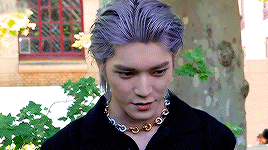
Olá, docinho de cereja! Estou fazendo um compilado de todos os garotos que nós já divulgamos por aqui, espero que te ajude.
dai jing yao (1993)
hu yi tian (1993)
ni han jin (1994)
liu hai kuan (1994)
xu kai (1995)
zhang xin cheng (1995)
ding yu xi (1995)
wang zi yi (1996)
dai gao zheng (1996)
luo yunxi, ator (1988)
zhu yilong, ator (1988)
jing boran, ator (1989)
wei zheming, ator (1990)
yang yang, ator (1991)
yu bin, ator (1991)
xiao zhan, ator (1991)
deng lun, ator (1992)
gong jun, ator (1992)
wu jiacheng, x-nine (1993)
liu haikuan, ator (1994)
ding yuxi, ator (1995)
lin yanjun, nine percent (1995)
ren hao, ator e r1se (1995)
wang haoxuan, ator (1995)
xu kai, ator (1995)
zhu zanjin, ator (1995)
chen bohao, ator (1996)
qian kun, nct (1996)
wang zhuocheng, ator (1996)
wen junhui ou jun, seventeen (1996)
yan an, pentagon (1996)
zhu zhengting, nex7 e nine percent (1996)
bi wenjun, nex7 (1997)
dong sicheng ou winwin, nct (1997)
huang xinchun, nex7 (1997)
wang yibo, ator e uniq (1997)
wang ziyi, solo e nine percent (1997)
xu minghao ou the8, seventeen (1997)
cai xukun, solo e nine percent (1998)
dylan wang, ator (1998)
song jiyang, ator (1998)
yao chen, r1se (1998)
zhang yanqi, r1se (1998)
#♡ · ✉️ : respondidas#( luffy o príncipe das sombras )#♡ · 🖼 : fc help#fc help#chinese fc#( help : boys )
6 notes
·
View notes
Note
can you please suggest me some chinese male fcs of around 25-32 years? thank you ♥
Lewis Tan (1987) Singaporean Chinese / British.
Ludi Lin (1987) Chinese.
Shannon Kook (1987) Hakka Chinese / Mixed South African.
Luo Yun Xi (1988) Chinese.
Zhu Yi Long (1988) Chinese.
Jing Bo Ran (1989) Korean.
Cheng Yi (1990) Chinese.
Lu Han (1990) Chinese.
Wei Zhe Ming (1990) Chinese.
Alexander Hodge (1991) Chinese Singaporean / Irish.
Zhang Zhe Han (1991) Chinese.
Yu Bin (1991) Chinese.
Xiao Zhan (1991) Chinese.
Jordan Connor (1991) is quoted as saying he "has a lot of Chinese" in his heritage, Vietnamese, Thai, Indonesian, Papua New Guinean, Samoan / Croatian, Spanish, Greek, Italian.
Yang Yang (1991) Chinese.
Gong Jun (1992) Chinese.
Deng Lun (1992) Chinese.
Vin Zhang (1993) Chinese.
Eddie Liu (1994) Chinese.
Wang Hao Xuan (1995) Chinese.
Leo Sheng (1996) Chinese - is trans.
Wang Zi Yi (1997) Chinese.
Ding Yu Xi (1997) Chinese.
Wang Zhuo Cheng (1996) Chinese.
Xing Zhao Lin (1997) Chinese.
Zhang Ling He (1997) Chinese.
Tony Giroux (?) Chinese and French.
Hey anon! I hope it's ok that I only listed people with resources at the time of posting because if not this list would be pretty lengthy, feel free to suggest anything more specific in a different ask!
3 notes
·
View notes
Note
Ji ji fu ji ji
a o e i i er ai ei ao ou an en ang eng ong i ia iao ie iu ian in iang ing iong u ua uo uai ui uan un uang ueng ü üe üan ün a o e er ai ao ou an en ang eng yi ya yao ye you yan yin yang ying yong wu wa wo wai wei wan wen wang weng yu yue yuan yun b ba bo bai bei bao ban ben bang beng bi biao bie bian bin bing bu p pa po pai pei pao pou pan pen pang peng pi piao pie pian pin ping pu m ma mo me mai mei mao mou man men mang meng mi miao mie miu mian min ming mu f fa fo fei fou fan fen fang feng fu d da de dai dei dao dou dan den dang deng dong di diao die diu dian ding du duo dui duan dun t ta te tai tei tao tou tan tang teng tong ti tiao tie tian ting tu tuo tui tuan tun n na ne nai nei nao nou nan nen nang neng nong ni niao nie niu nian nin niang ning nu nuo nuan nü nüe l la le lai lei lao lou lan lang leng long li lia liao lie liu lian lin liang ling lu luo luan lun lü lüe g ga ge gai gei gao gou gan gen gang geng gong gu gua guo guai gui guan gun guang k ka ke kai kei kao kou kan ken kang keng kong ku kua kuo kuai kui kuan kun kuang h ha he hai hei hao hou han hen hang heng hong hu hua huo huai hui huan hun huang z za ze zi zai zei zao zou zan zen zang zeng zong zu zuo zui zuan zun c ca ce ci cai cao cou can cen cang ceng cong cu cuo cui cuan cun s sa se si sai sao sou san sen sang seng song su suo sui suan sun zh zha zhe zhi zhai zhei zhao zhou zhan zhen zhang zheng zhong zhu zhua zhuo zhuai zhui zhuan zhun zhuang ch cha che chi chai chao chou chan chen chang cheng chong chu chua chuo chuai chui chuan chun chuang sh sha she shi shai shei shao shou shan shen shang sheng shu shua shuo shuai shui shuan shun shuang r re ri rao rou ran ren rang reng rong ru rua ruo rui ruan run j ji jia jiao jie jiu jian jin jiang jing jiong ju jue juan jun q qi qia qiao qie qiu qian qin qiang qing qiong qu que quan qun x xi xia xiao xie xiu xian xin xiang xing xiong xu xue xuan xun
6 notes
·
View notes
Text
Top Drama China Historical yang akan Datang
serial drama historical andalan 4 jaringan china yang akan datang.
腾讯 (tencent)
1.梦华录 Meng Hua Lu - A Dream of Splendor - Crystal Liu Yi Fei , Chen Xiao, Jelly Lin
2.玉骨遥 The Longest Promise - Xiao Zhan, Ren MIn, Wang Chu Ran, Han Dong, Alen Fang
3.星汉灿烂 Love Like The Galaxy - Zhao Lusi, Leo Wu, Zeng Li
4.春闺梦里人 Romance of a Twin Flower - Ding Yuxi, Peng XiaoRan
5.重紫 Chong Zhi - Yang Chao Yue, Jeremy Tsui, Zhang Zhi Xi
6.说英雄谁是英雄 Heroes - Joseph Zeng, Yang Chal Yue, Liu Yu Ning, Baron Chen, Meng Zi Yi, Sun Zu Jun
7.雪鹰领主 Lord Eagle - Sheng Ying Hao, Sun Rui, Fei Qin Yuan
8.乐游原 Wonderland of Love - Xu Kai, Jing Tian, Zhao JIa Min, Gao Han, Zheng He Hui Zi, He Feng Tian
9.长相思 Lost You Forever - Yang Zi, Deng Wei, Zhang Wan Yi
10.天行健 Heroes (judul rencana akan diubah biar ga tabrakan) - Qin Jun Jie, Maggie Huang, Liu Yu Ning
11.飞狐外传 - The Young Flying Fox - Qin Jun Jie, Liang Jie, Xing Fei, Peter Ho, Sarah Zhao, Lin Yu Shen, Hei Zi, Yvonne Yung
12.只此江湖梦 - Love and Sword - Gao Wei Guang, Xuan Lu, Jia Nai, Martin Zhang, Yuan Yu Xuan, Ren Hao
爱奇艺 (iqiyi)
1.月歌行 - Song of the Moon - Vin Zhang, Xu Lu
2.云襄传 - The Ingenious One - Chen Xiao, Rachel Momo, Tang Xiao Tian
3.显微镜下的大明 - Great Ming Under Microscope - Zhang Ruoyun, Qi Wei, Wang Yang
4.明月入卿怀 - A Forbidden Marriage - Mao Zi Jun , Zhou Jie Qiong , Zhang Xin ,Li Jiu Lin, Eddy Ko
5.请君 - Welcome - Ren Jia Lun, Li Qin
6.七时吉祥 - Love You Seven Times - Ding Yu Xi, Yang Chao Yue ,Yang Hao Yu, Dong Xuan, Hai Lu
8.倾城亦清欢 - The Emperor's Love - Wallace Chung, Yuan Bing Yan, Jason Gu, Zhang Yue
9.九霄寒夜暖 - Warm Cold Night in the Nine Heavens - Li Yi Tong, Bi Wen Jun, Chen He Yi, He Rui Xian, Ma Yue
10.苍兰诀。 - Eternal Love - Yu Shu Xin, Dylan Wang, Cristy Guo, Xu Hai Qiao
11.花溪记(分销) - Love Is An Accident - Xing Fei, Xu kai Cheng, Wang Yi Nuo
12.花戎。 - Hua Rong - Ju Jing Yi, Guo Jun Chen, Liu Dong Qin, Lu Ting Yu, Ma Yue
优酷 (youku)
1.长月烬明 - Till The End of The Moon - Luo Yunxi, Bai Lu, Chen Du Ling, Deng Wei, Sun Zhen Ni, Wang Yifei
2.星河长明 - Novoland: The Princess From Plateau - Feng Shao Feng, Peng Xiao Ran, Cheng Xiao Meng, Zhu Zheng Ting, Liu Meng Rui, Kim Jin
3.沉香如屑。- Immortal Samsara - Yang Zi, Cheng Yi, Ray Chang, Meng Zi yi, Yang Xizi, Hou Meng yao
4.星落凝成糖 - Love When the Stars Fall - Chen Xing Xu, Landy Li, Luke CHen, He Xuan Lin
5.郎君不如意。- Go Princess Go 2 - Wu Xuan yi, Chen Zhe Yuan, LQ Wang
6.隐娘 - The Assassin - Qin Lan, Zheng Ye Cheng, Hu Lian Xin, Du Chun
7.安乐传 - Legend of Anle - Dilraba Dilmurat, Gong Jun, Liu Yu Ning, Xia Nan, Tim Pei, Chen Tao
芒果TV (mango tv)
1.落花时节又逢君 - Love Never Fails - Yuan Bing Yan,Liu Xue Yi, Xu Xiao Nuo, Ao Rui Peng
2.覆流年 - Lost Track of Time - Xing Fei, Zhai Zi Lu, Jin JIa Yu, Cheng Yu Feng, Zhan Jie, Han Ye
catatan: nanti saya update judul resmi inggris dan siapa aktor aktrisnya.
sumber: artikel topik upcoming chinese drama di cerita-silat.net dan Weibo
8 notes
·
View notes
Text
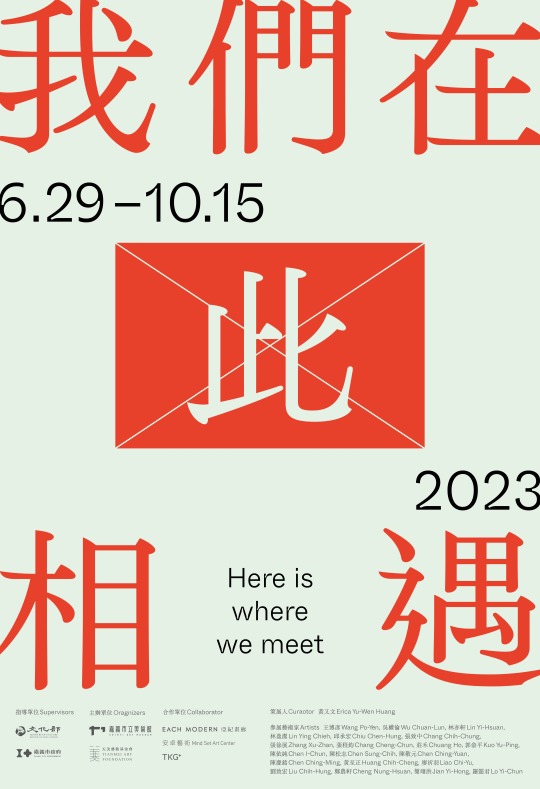
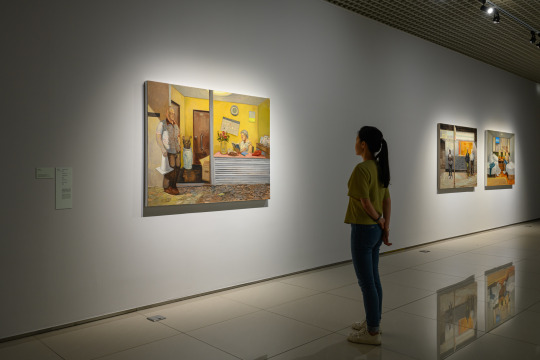
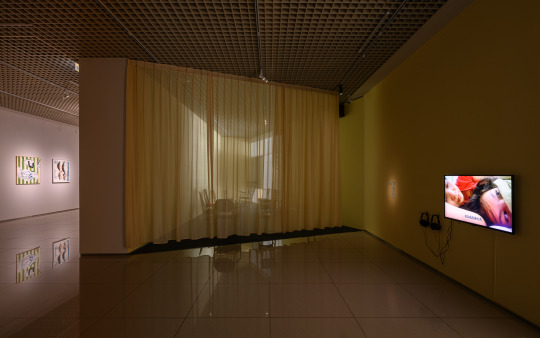




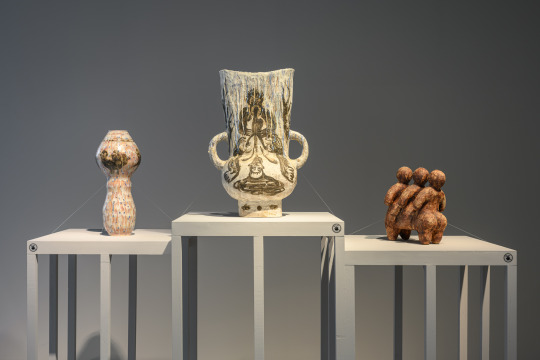

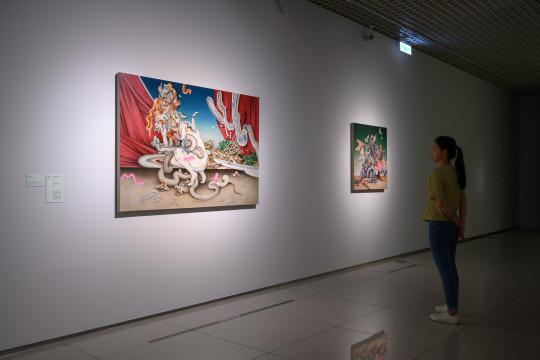

Here is where we meet
Here is where we meet
2023/06/29-10/15
Venue: Chiayi Art Museum 1F-3F
Supervisors:Ministry of Culture, Chiayi City Government
Organizers:Chiayi Art Museum, Tianmei Art Foundation
Collaborators:TKG+, Mind Set Art Center, Each Modern
Curator:Erica Yu-Wen Huang
Artists:Wang Po-Yen, Wu Chuan-Lun, Lin Yi-Hsuan, Lin Ying-Chieh, Chiu Chen-Hung, Chang Chih-Chung, Zhang Xu-Zhan, Chang Cheng-Chun, Chuang Ho, Kuo Yu-Ping, Chen I-Chun, Chen Sung-Chih, Chen Ching-Yuan, Chen Ching-Ming, Huang Chih-Cheng, Liao Chi-Yu, Liu Chih-Hung, Cheng Nung-Hsuan, Jian Yi-Hong, Lo Yi-Chun
Archive Room - Participating Artists:Ding Chien-Chung, Niu Jun-Qiang, Wang Po-Yen, Shih Meng-Hsin, Wu Chuan-Lun, Li Yi-Fan, Li Ting-Huan, Lin Hao-Bai, Lin Yi-Wei, Lin Ying-Chieh, Chiu Chen-Hung, Chiu Chien-Jen, Hung Sheng-Hsiung, Hsu Yin-Ling, Shiu Sheng-Hung, Chang Chih-Chung, Zhang Xu-Zhan, Chang Cheng-Chun, Chang San-Hsueh, Chuang Ho, Kuo I-Chen, Kuo Yu-Ping, Chen I-Chun, Chen Sung-Chih, Chen Kuan-Ying, Chen Fei-Hao, Chen Ching-Yuan, Chen Ching-Ming, Huang Chih-Cheng, Huang Xuan, Yang Han-Chiao, Liao Chi-Yu, Liao Zen-Ping, Liu Chih-Hung, Liu Feng-Ling, Cheng Nung-Hsuan, Ou Jing-Yun, Hsieh Jhou-Yu, Jhong Jiang-Ze, Lo Chan-Peng, Luo Jr-Shin, Lo Yi-Chun
1 note
·
View note
Text
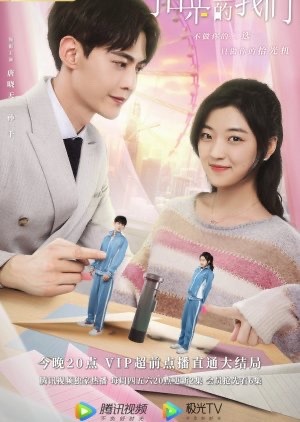
Way Back Into Love. 6
Story: 6
Acting: 8
Chemistry: 8
Comparable to: Way Back Into Love (twdrama);
Honestly I was never fond of the Taiwanese version of this remake so I was never hype up for this drama at all. To me it’s mostly a mediocre drama. The storyline is okay and that’s part of problem. it felt like the drama was kinda slow at times with a kinda blah plot without any wow factor to it as well as the two main leads lacking the sparks . I don’t know I just wasn’t liking this one.
#way back into love#cdrama#viki#wetv#tang xiao tian#sun qian#Wang You Jun#zhang hao lun#chen qian#chen xun#romantic drama#family#comedy#remake
1 note
·
View note
Photo

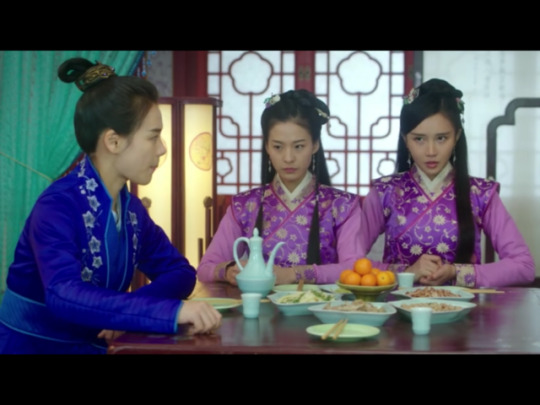




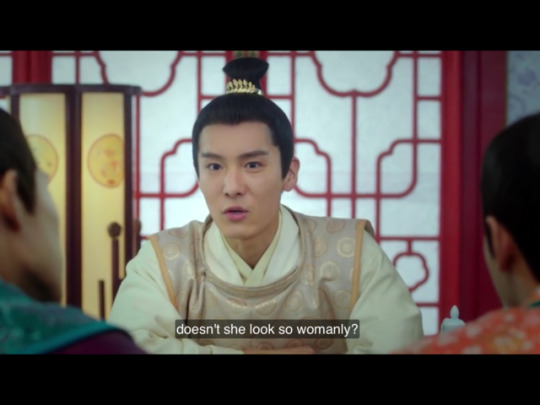
Ye Zhao teases the Qui sisters for threatening the young lords (both their big sisters are in the harem of the Emperor)
Yu Jin thinks his wife is the prettiest soldier in the Emperor’s military.
#ma sandra#sheng peter#sheng yi lun#ma si chun#jiang jun zai shang#general on top#oh my general#pan shi qi#pan sookie#wang xuan#chinese drama#based on novel#comedy#fantasy#xiang hao#zhang jia yi
10 notes
·
View notes
Text
All the Chinese Dramas/Movies I’ve Watched or Started (85 Listed Here)
Painted Skin 1 (Hua Pi 1) (movie)
Painted Skin 2 (Hua Pi 2) (movie)
She Diao Ying Xiong Zhuan 2008 (Legend of the Condor Heroes)
Shen Diao Xia Lv 2006 (Return of the Condor Heroes)
Xiao Ao Jiang Hu 2013 (The Smiling, Proud Wanderer)
Tai Zi Fei Sheng Zhi Ji (Go Princess Go)
Huan Cheng (Ice Fantasy)
Hua Qian Gu (Journey of the Flower)
San Sheng San Shi Shi Li Tao Hua (Ten Miles of Peach Blossoms)
Chu Qiao Zhuan (Princess Agents)
Shuang Shi Chong Fei (The Eternal Love)
Legend of Fu Yao
Yan Xi Gong Lve (Yanxi Palace)
Ruyi Zhuan (Ruyi’s Royal Love in the Palace)
Zhen Hun (Guardian)
Zhifou Zhifou Yin Shi Lv Fei Hong Shou (Story of Minglan)
Xu Ni Fu Sheng Ruo Meng (Granting You a Dreamlike Life)
Bian Cheng Lang Zi (Border Town Prodigal)
Xia Zhi Mo Zhi (Rush to the Dead Summer)
Shuang Shi Chong Fei 2 (The Eternal Love 2)
She Diao Ying Xiong Zhuan 2017 (Legend of the Condor Heroes)
Xiang Mi Chen Chen Jin Ru Shuang (Ashes of Love)
Dong Gong (Goodbye My Princess)
Mei Zhe Wu Jiang (Bloody Romance)
Legend of Yunxi
Dugu Tianxia (Legend of Dugu)
Xiao Nv Hua Bu Qi (I Will Never Let You Go)
Qin Shi Li Ren Ming Yue Xin (King’s Woman)
Huan Le Song (Ode to Joy)
Huan Le Song 2 (Ode to Joy 2)
Qin Ai De, Re Ai De (Go Go Squid)
Ying Xiong 2002 (Hero) (movie)
Shi Mian Mai Fu (House of Flying Daggers) (movie)
Zhi Wo Men Dan Chun De Xiao Mei Hao (A Love So Beautiful)
Bai Fa (Princess Silver)
Zhen Huan Zhuan (Empresses in the Palace)
Bubu Jing Xin (Scarlet Heart, Chinese version)
Zhi Wo Men Nuan Nuan de Xiao Shi Guang (Put Your Head on my Shoulder)
Bai She: Yuan Qi (White Snake) (animated movie)
Chen Qing Ling (The Untamed, live action)
Mo Dao Zu Shi (Grandmaster of Demonic Cultivation, donghua)
Jing Ying Lv Shi (The Best Partner)
Qing Yun Zhi (Noble Aspirations aka Legend of Chusen)
Qing Yu Nian (Joy of Life)
Meng Hui Da Qing (Dreaming Back to the Qing Dynasty)
Legend of Hao Lan
Jiang Ye (Ever Night)
Fa Yi Qin Ming (Medical Examiner Dr. Qin) (2016 version with Zhang Ruoyun)
Wu Xin Fa Shi (Wu Xin: The Monster Killer)
Gu Hua (Talking Bones)
Xin Ling Fa Shi (The Listener)
Jiu Zhou Tian Kong Cheng 2016 (Novoland Castle in the Sky)
Wu Dong Qian Kun (Martial Universe)
Wo Zhi Dao Ni De Mi Mi (I Know Your Secret)
Da Song Bei Dou Si (Plough Department of Song Dynasty)
Ai Qing Jin Hua Lun 2018 (Evolution of Our Love)
Da Wang Bu Rong Yi (King is Not Easy)
Qing Ping Yue/Gu Cheng Bi (Serenade of Peaceful Joy/Held in the Lonely Castle)
Lang Ya Bang (Nirvana in Fire)
Xia Tan Jian Buzhi (Ancient Detective)
Gu Jin Da Zhan Qin Yong Qing (Fight and Love with a Terracotta Warrior)(movie)
Shen Tan (Detective L)
Min Guo Qi Tan (My Roommate is a Detective)
He Shen (Tientsin Mystic)
Zui Ye Wu Jian (Evil Nights)
Jue Ji Lin Jie Tian Xia (LORD Critical World)
Xiong An Xian Cheng (The Truth)
Wei Zhuang Zhe (The Disguiser)
Chuan Shuo Zhong de Chen Qianqian (Romance of Tiger and Rose)
Ru GUo Wo Niu You Ai Qing (When a Snail Falls in Love)
Xi You Ji 2019 (Tian Zhen Pai version) (Journey to the West)
Dian Xia Gong Lue (To Get Her)
Hong Lou Meng (Xiao Xi Gu version) (Dream of the Red Chamber)
Ming Xing Da Zhen Tan (Who’s the Murderer)
Hong Lou Meng 1987 (Dream of the Red Chamber)
Xiao Huan Xi (Little Reunion)
Fei Ren Zai (Non-human) (animated series)
Da Song Shao Nian Zhi (Young Blood)
Lang Ya Bang 2 (Nirvana in Fire 2)
Hei An Zhe (Death Notify: The Darker)
Hen Ji (Trace)
Jin Yi Zhi Xia (Under the Power)
Wai Ke Feng Yun (Surgeons)
Shao Nu Da Ren (Maiden Holmes)
Ren Zha Fan Pai Zi Jiu Xi Tong (Scum Villain Self-saving System)
34 notes
·
View notes
Text
Five Mineral Drug
Five mineral powder (or wushi), also known as cold food powder (or hanshi), was one of the most widely used drugs in medieval China. I have read the paper Lebensstil und Drogen im chinesischen Mittelalter by Rudolf G. Wagner and thought that those who can’t speak German might want to know more about it as well. In this, I will explain how it was found and popularized, the people who took this, symptoms, side effects, etc.
So I picked out a few texts and translated the translations from German to English. Keep in mind that the translation had gone from being originally written in Middle Chinese to being translated to German by Wagner, and then being translated by me in English. This is not an official translation, and I don’t want it to be treated as such. I tried finding alternative translations but in the end, I had to resort to translating most of it myself. My translations (which are Wagners translations) are marked with a ・ .
And also for those not bright enough: DO NOT RECREATE THIS TRASH! DO NOT ATTEMPT TO CONSUME IT! Jesus
Five Mineral Drug Before He Yan
There is not much known about the History before He Yan’s lifetime, but we have the following statement by Qin Zhengzu in his work Hanshi san lun ・ :
Although the recipe for the cold food powder originates in the Han Dynasty, there were not many who used it. But when the shangshu (He Yan) achieved godly mental abilities (because of the drug), it spread immensely throughout the era.
In Chao Yuanfang’s work Chaoshi Zhubing Yuanhuo [1] which citates Huangfu Mi ・ :
Where the drug came from is not known. Some say Hua Tuo invented it, others say it was Zhang Ji. If one examines the truthfulness on these accounts, it was plausible for Hua Tuo’s talent to invent simple recipes (which does not apply to the five mineral powder). In a text written by Zhang Ji, there is a recipe called Houshi Hei (Black Powder by Sir Hou) and a Zushi Ying recipe, both of those, have a similar composition like the Five Mineral Powder, and the codes of conduct (for the ingestion) are more or less the same. According to those two recipes, the plant-based and the mineral-based, I deduce the origins stem from Zhang Ji and not Hua Tuo.
Remarkable is that Huangfu Mi had to speculate even though He Yan was dead for only 30 years. Rudolf G. Wagner comments that Huangfu’s explanation could ring true because Zhang Ji was known as a doctor specialized in Shanghan diseases (cold diseases). Summarized we know that the drug was probably invented in the Han Dynasty and that it was meant to be used as medicine.
He Yan and the Popularization of The Five Mineral Drug
He Yan (d. 249) was the grandson of He Jin and grandnephew of Empress Dowager He. His mother Lady Yin, who was formerly the wife of He Xian, became the concubine of Cao Cao. Although he was closely affiliated with the imperial clan (through his mother and his wife Princess Jinxiang), he was largely unrecognized by them, Wendi of Wei even calling him a ‘false son'. He stayed out of government until Mingdi of Wei’s death. He Yan cultivated a circle of friends of scholarly interests, on which he exerted influence. His contemporaries include Wang Bi, Xiahou Xuan, Deng Yang, Li Sheng, and Zhuge Dan.
At the regency of Cao Shuang, he and his circle would take great influence in the years from 240 to 249, which was known as the Zhengshi era. He and Wang Bi (226-249)achieved great scholarly achievements in Neo-Daoism, also known as Xuanxue. The cultural, scholarly, and scientific advancements were unparalleled and imitated in later years. But the regime by Cao Shuang and his co-regent Sima Yi (179-251) would prove to be highly unstable. Cao Shuang and his circle came to represent the new elites with Xuanxue as their philosophy, and Sima Yi represented the orthodox Confucian landholders, who would feel threatened by He Yan and his friends who represented in many the new powerholders. Internal strifes in Cao’s faction and Sima Yi’s short retreat from the court would result in a coup d'état against Cao. Cao Shuang, He Yan, his supporters, and their families were all executed.
For a more thorough analysis on He Yan, I highly recommend DaolunofShiji’s A Case For He Yan.
He Yan was described in the He Yan Biezhuan:” His figure and face were of outstanding beauty; when he went outside, for a walk, onlookers would fill the streets; many said he was a genius”. Further, the Weilüe states: “...in all activities white cosmetic powder did not leave his hands, when walking he looked back at his shadow.” As a dandy, outstanding debater, and philosopher, he would dictate the beauty and philosophical trends, of not only his day but for the next centuries. For example, the former standards of attractiveness were in the Late Han Dynasty a warriorlike appearance with great strength to accompany it. Because of He Yan, the standards changed to a more docile and graceful appearance.
As a trendsetter, with no doubt many admirers, he introduced the drug in the Wei elite with his description of the drug cited in the Shishuo Xinyu: “Whenever I take five-mineral powder, not only does it heal any illness I might have, but I am also aware of my spirit and intelligence becoming receptive and lucid.” It’s popularity rose in the Wei-Jin elite as following anecdotes describe:
Chao Yuanfang’s work which cites Huangfu Mi in Chaoshi Zhubing Yuanhuo・ :
In youngest times, the shangshu He Yan devoted himself to music and appreciated sex, when he took the drug for the first time, his consciousness gained more clarity and his physical strength increased. In the capital (of Wei), everyone passed the drug around... After the death of He Yan, those who took the drug multiplied, and it didn’t slow down with time.
The drug not only aids ‘spirit and intelligence’ but also increases the enjoyment of music and sex.
Cao Shuang’s biography in the Sanguozhi [2]:
Shuǎng’s drink and food and chariots and clothing, imitated the Imperial carriage; craftsmen treasures and toys, filled up his house; wives and concubines filled his Rear Courtyard, and he also secretly took the Former Emperor’s Talent concubines of seven to eight women, and his offices and officials, teachers and workers, drums and horns, elite family’s sons and daughters of thirty-three people, all became his performers and musicians. He forged Imperial Order documents, sending out Talent concubines of fifty seven women to Yè terrace, and having the Former Emperor’s Fair concubines teach and practice performance. He usurped the Grand Musician’s musical instruments, and the Military Store’s prohibited weapons. He made cavern residences, fine engraving all around, repeatedly with [Hé] Yàn and the rest meeting inside, drinking liquor and making merry.
Rudolf G. Wagner analysis that this scene is also in correlation to the five mineral powder, mainly being in a ‘cavern residence’ which helps with the side effects of the powder (I will explain the side effects later on). Also, the ‘Talented Concubines’ (who are Mingdi’s concubines), the excessive wine drinking, and the musical instruments indicate that the circumstance has been applied to fit the positives of using the drug and to alleviate the side effects.
Of course, this lifestyle would take a toll on He Yan’s health, as the powder that could ‘heal any illness’ betrayed him. As Guan Lu observed, not only He Yan but also his colleague Deng Yang were greatly weakened. The anecdote is in the Guan Lu biezhuan which you can find in his Sanguozhi biography[3]:
Deng Yang's gait is that of one whose sinews are loosed from his bones, and his pulse is unsteady. When he would stand, he totters as a man without limbs. This is the aspect of a disembodied soul. He Yan looks as if his soul was about to quit its habitation. He is bloodless, and what should be solid in him is mere vapor. He looks like rotten wood. This is the aspect of a soul even now in the dark valley.
Also the He Yan Biezhuan further states:” He had such a weakened constitution, that he couldn’t wear heavy silk anymore.” It is plausible that it is attributed to the drugs, the heavy silk could either produce more heat than he could handle, or it could apply pressure to the ulcers, you get from this drug, (but then again we will talk about the side effects later). Hao Yicheng (1757-1825) commented that if Sima Yi didn’t killed him, that he would have passed away anyway, because of the consequences of his drug use.
He Yan’s Legacy in Relation to the Drug
He Yan was the most important person concerning the rise of the drug in Wei-Jin circles. He was blamed for the moral decay of the elite, and over the centuries, criticized regularly for it. The following memorials bear witness to it:
Pei Wei’s (267-300) (whose father Pei Xiu passed away because of the drug, we will get to that later) memorial, which can be found in the Jinshu 35, criticizes Wang Yan and others for their admiration and imitating the actions of He Yan and Ruan Ji. It is explicitly mentioned that their rolemodels like themselves ran around naked, being unable to follow the rites.
Fan Ning, in the reign of Emperor Jianwen (reg. 371-373), presented in a memorial, which you can find in the Jinshu 75, in which he criticized He Yan and Wang Bi ‘That the faults of He Yan and Wang Bi are greater than Jie’s and Zhou’s faults’. Those two ‘terrible last rulers’ were considered evil, but only corrupted their own generation. He Yan and Wang Bi, on the other hand, exceeded the faults of ‘barbarians’ because their negative influence in all areas, corrupted the elite, the execution of He Yan and the establishment of a new dynasty affecting nothing to the problem. He is also implying that because the Jin elite followed He Yan’s and Wang Bi’s teachings, they couldn’t defend the north from the ‘barbarians’.
Sun Simiao (581-682) wrote in his treatise ‘Declaration of the Toxicity of the Five Mineral Powder’ which is in the Qian Jin Yao Fang ・ :
The revival medicine cold food powder or five mineral powder, according to old reports, were not known to recipe specialists, but (its use) began with the Marquis He after the end of the Han.
Since Huangfu Mi among those, who were tricked by this temptation, there were none, whose back didn’t inflame, whose bones didn’t disintegrate and who didn’t subject themselves to destruction. Since I can remember, it hasn’t struck only one from those who I knew, who came from the capital.
Su Shi (1036-1101) wrote in his memorial ‘The Memorial of Shangyang’ Lun Shangyang the following ・ :
It began with He Yan, that the people took stalactites and wushi (different word for fuzi: aconite), and gave themselves uncontrolled to wine and sex, to prolong their life. (He) Yan was in his youth rich and honored, how should one be surprised, that he took the cold food powder, to satisfy his desires? What he caused with that (that the powder spread), was enough to kill people and to destroy families. Every single day. How awful it is to die from the cold food powder - But what can I alone do? Those who take the cold food powder and whose backs are decaying (are so numerous), that they step on each other's feet!
Yu Zhengxie (1775–1840) wrote in his work Guisi Cungao the following, comparing the five mineral powder to opium ・ :
The nobles and dignitaries haven’t asked themselves if they have an illness or not, but it became fashionable with He Yan to take this drug without reason. The people of Wei and Jin took this drug and were not able to come back to their senses until the end of their lives...
The powder of Wei and Jin and the ‘pill’ of Tang and Song are the worst and are comparable with today’s opium. Under the Jin, Tang, and Song the governments, however, haven’t banned (these drugs), whereas today opium is banned; That’s how one can see that only the present government is handling the problem correctly.
The Recipe
First, we examine He Yan’s Five Mineral Powder Recipe, referenced in Sun Simiao’s (581-682) work Qian Jin Yi Fang, where mentioned in a note that if two components (sulfur and red clay containing silicon) are removed from the Wushi Gengsheng San recipe, you are left with Sanshi Gengsheng, Marquis He’s original recipe. The ingredients are listed here:
Zhongru (stalactite) 2.5 liang
Baishi Ying (milky quartz) 2.5 liang
Haige (oyster shell) 2.5 liang
Zishiying (amethyst) 2.5 liang
Fangfeng (Siler divaricum) 2.5 liang
Gualou (Trichosanthes kirilowii) 2.5 liang
Ganjiang (Zingiber officinale) 1.5 liang
Baishu (Atractylis ovata) 1.5 liang
Jiegeng (Platycodon grandiflorum) 5 fen
Xixin (Asarum Sieboldi) 5 fen
Renshen (Panax ginseng) 3 fen
Fuzi (Aconitum L.) cooked, with the removed shell 3 fen
Guixin (cinnamon tree bark from a smaller branch)
And very important is expensive wine.
As Wagner points out, his list of ingredients isn’t exact, because of the many variables the identification of those ingredients has (pharmacological variables, terms describing the ingredients, the provenance of the plants, etc.). But we can establish the most important ingredients: stalactite, aconite, and herbs such as ginger, ginseng, etc..
In Xi Kang’s (223-262) biography in the Jinshu 49, we see that stalactite could be consumed on its own ・ :
Xi Kang also met with Wang Lie, and together they went to the mountains. Lie found a stone, with the form resembling a sugar hat. Lie took half of the stone and gave the other half to Xi Kang. Both froze and turned to stone.
Donald Holzman, in his book La vie et la pensée de Hi K’ang identifies the ‘stone resembling a sugar hat’[4] as a stalactite, which is in He Yan’s recipe.
Little side note ‘turned to stone’ is indeed comparable with the slang ‘getting stoned’.
Pharmacological Effects
Before we turn to the preparation of the drug, I’d like to point out the fact that we only vaguely know what components lead to the psychoactive effect. Wagner wrote in his paper that he tried to have people knowledgeable in these regards, research with him, but it didn’t work out. If you want to learn more in this regard, I can’t help you.
Preparation of the Drug and Codes of Conduct
According to Huangfu Mi the minerals have to be prepared (I assume grinding it into a powder) and then they have to rest for 30 days. The plants are prepared on the day of ingestion.
The following texts are in Chao Yuanfang’s work Chaoshi Zhubing Yuanhuo and in Sun Simiao’s work Qian Jin Yi Fang ・ :
Those who take the Hanshi powder, take the amount of 2 liang, this amount is divided into three pastes.
At sunrise, he takes with hot, excellent wine the first paste. When the sun has moved one chang (meaning two hours), in turn, he takes the other paste. When the sun has moved a second chang, he takes the last paste, having used up everything.
After a while, he should wash his hands and feet with cold water. When the energy of the drug is working, one will feel numb. Thereupon he undresses and bathes in cold water. When the power of the drug gets stronger and the body is cooled, the mind opens to clarity, and one recovers from the hardships, even for those who lie weakened and suffering in their bed, it will improve before the day ends.
There are people of weak or strong constitution, and there is different tolerability of the drug for many. If the person using the drug is emaciated and weak, he can eat a little before taking the drug. But when the person is strong, he doesn’t need to eat...
One always has to dress cold, drink cold, eat cold, and sleep cold. The colder the better. If the drug didn’t had an effect yet, one shouldn’t bathe cold yet; if one bathes in this situation, it will result in a painful cold, blocking the drug’s effect, leaving the person shivering. Rather (if the drug is blocked) one should drink warm wine, jump, dance, and rub themselves, to achieve the effect, if one starts to get warm, then they should bathe. If the (situation where the drug hasn’t reached the effect) has been dealt with, one should stop and not overdo (the cooling). Also one should eat cold multiple times (a day), not only in the morning and evening. If one refrains from eating and getting so hungry, then it’s causing the person, to get cold, and only if he eats he will warm up.
The ingredients suggest a high content of calcium, explaining the feverish symptoms. For those symptoms of heat, it was also common to just remove the clothes and go around naked.
Further we are informed that 2 liang isn’t an universal dosage, about that Huangfu Mi writes, which is cited in Chao Yuanfang’s work Chaoshi Zhubing Yuanhuo ・ :
As far as seniors and children are concerned, who can’t tolerate (the normal amount, 2 liang) - here you can set the dosage under 2 liang. When the person is robust, you can set the dosage above two liang... Even though this medicine is excellent and can double the strength and spirit, it is indeed difficult to correctly dosage it.
Cao Xi (Yes from the imperial family) wrote also an explanation on the correct codes of conduct, which could criticize Huangfu’s suggestions which is quoted in Tamba Yasuyori’s work Ishimpo [5] ・ :
In general, one has to, when someone is taking the cold food drug, when it becomes too strong, consistently (focus on the condition) of the one taking the drug, and administer (fitting) healing recipes.
The body and liquids of the human flesh are (for different people) differing like earth and wind (as they are different in other places)Although it is said (by Huangfu Mi?), that one should drink wine, there are people who can do that, and those who cannot.
Although it is said (by Huangfu Mi?), one always has to stay cool, there are bodies of people, there are ones who can bear the cold, and those who can’t.
Although it is said (by Huangfu Mi?), one should eat and drink a lot, there are for food and drink different amounts (of digestibility).
Although it is said (by Huangfu Mi?), one should always exercise, there are different stabilities of the bone, ones who are strong and ones who are weak.
Because the people are thick and thin, old and young, have in their bodies illnesses or not, those who have much warmth and those who have much coldness, one cannot treat (the side effects) them with the same method.
A strong rise of the drug has many aspects and produces hundreds of illnesses.
As those symptoms can be useful in identifying anecdotes where someone is ‘under the influence’, as we turn to the next section.
The Stoned Nobles
Yes, Huangfu Mi called them “The Nobles turned to Stone”.
As it is mentioned the drug spread in He Yan’s lifetime and long after that. In the Guan Lu biezhuan there is instance recorded where Pei Hui asked his subordinate Zhao Kongyao why he isn’t looking well, Zhao replied ・ :”I have the misfortune, that no drug-minerals are remaining in my body.”
As Qin Zhengzu writes in his work Hanshi san lun ・:”Those who took (the powder), searched each others company.” The nobles of that time met in ‘drugparties’ which were most of the time called ‘wineparties’. The language describing those gatherings resembled those of wineparties. For example it is mentioned in the Jinshu 35 that Shi Chong (249-300) once wanted to sue Sun Lishu for not having acted according to the rites at his wineparty, but Pei Kai admonished Shi Chong by saying ・ :”You gave someone a wild drug and expect correct ritual behavior - isn’t that wrong?”
Then we of course have the parties by Cao Shuang, being prime examples of drug use. Of course the one mentioned in the Sanguozhi but also the one mentioned in Zhong Hui’s biography for his mother ・ :
At this time the Great General Cao Shuang alone held the goverment; he gave himself daily to wine until he became heavily drunk. The elder brother of Hui, the shizhong (Zhong) Yu told what happened on these parties. My mother (Zhong Hui’s mother) said:’ When they are having their fun, they are just having their fun, but it won’t last long. When those of high rank, aren’t arrogant and follow the rules and regulations, then they aren’t getting themselves in trouble. If they overdo it, a tragedy will happen. (Those who are in the government) have an excessive wastefulness. This is not the way to keep wealth and high positions’.
The seven sages of the bamboo grove were also known to be fond of the drug. We know of course that Xi Kang took stalactites, the other members showed also similar symptoms described in the following texts:
Wang Yin’s Jinshu biography cited in the Shishuo Xinyu ・ :
At the end of Wei, Ruan Ji drank heavily, neglecting himself completely, showed his hair in an unkempt state in public, and sat naked with sprawled out legs.
Liu Ling’s love for wine is well recorded, but we see him naked here as well, indicating of course this is a incident of drug use, it’s cited in the Shishuo Xinyu [6] :
Liu Ling was an inveterate drinker and indulged himself to the full. Sometimes he stripped of his clothes and sat in his room naked. Some men saw him and rebuked him. Liu Ling said, “Heaven and earth are my dwelling, and my house is my trousers. Why are you all coming into my trousers?”
Not only in the nobility was the drug popular, but emperors also took this. Emperor Huidi of Jin once had a party with youths of the nobility, it’s cited in the Jinshu 27 ・ :
Huidi hosted in the Yuankang era (291-299) a wine party with the high ranking and entertainment seeking youths (of the elite), they let their hair down and undressed in front of the slaves serving as concubines. Those who wouldn’t participate in it fell from grace, those who rejected it were criticized. Only a few nobles wouldn’t participate in it because of embarrassment, and they were presented as they would lack reverence (towards their ruler).
Interesting to see that not only the use of the drug only had a small opposition, but those who refused to participate in those drug parties were put under pressure. It was not only Huidi of Jin who used the five mineral powder but also emperor Tuoba Gui who personally beat those to death who argued against his drug use and displayed their corpses in the ‘hall of heavenly peace’.
After the fall of Western Jin the nobles took their drug culture with them south, as it is described in an anecdote with ‘The Eight Da’ which is cited in the Jinshu 49 [7]:
Humu Fuzhi, Xie Kun, Ruan Fang, Bi Zhuo, Yang Man, Huan Yi and Ruan Fu were sitting together naked and with disheveled hair in a closed room; they had already been drinking for several days. (Guang) Yi (Humu Fuzhi’s protege whom they had not seen for years, arrived and) was about to push the door open and to enter, but the guardian did not allow him (to come in). He thereupon stripped himself outside the door, put off his hat, (crept) into the dog-hole and looked at them, shouting loudly. (Humu) Fuzhi was startled and said:’Other people definitely cannot do so. That must be our Mengzi (i.e. Guang Yi)’. He immediately called him in, and together with him they (went on) drinking day and night, without stopping. Their contemporaries called them ‘the Eight da’.
The Five Mineral Drug and Women
Wagner comments on the question if women took the drug as well, that they were only sexual objects or musicians. They were not members of the circle who took them for psychoactive purposes.
But that doesn’t mean they didn’t consume it. Certainly, they didn’t participate in parties like the scholar gentry, but they used it like most as medicine. In Chao Yuanfang’s work Chaoshi Zhubing Yuanhuo [8] it says:
When a pregnant woman catches cold and suffers from serious pain in her body, and she cannot be moved because of her condition, taking a dose of Cold Food Powder in warm wine and having a cold bath can do her good. After this, if she feels numbness somewhere on her body, the area should be washed with cold water, if she feels cold, drink some doses of wine...
Considering the fact that He Yan ignored the drug’s intended purposes, it is probable that not all women of that time weren’t so strict on using it purely as medicine either.
Also worth mentioning is that women took other substances like cinnabar, in the tomb of Wang Danhu 200 pills were found, which contained cinnabar. Cinnabar was mainly used in alchemy to either achieve immortality, or immortality of the corpse (to preserve it). But in the Tang dynasty, it replaced the five mineral powder, for it was also psychoactive.[9]
Five Mineral Drug and the Common People
To clarify, the five mineral powder was a luxury commodity. The powder itself wasn’t cheap and you had to mix it with expensive wine. There were no people who could profit from peasants getting addicted, there was no point in getting someone addicted to a substance he couldn’t even in the slightest afford. The five mineral powder was in every aspect a status symbol.
And because it was a status symbol people who couldn’t afford the powder would feign to suffer from the side effects of the powder. An anecdote from the Taiping Guangji 247 states ・ :
In the Northern Wei under Xiaowendi (reg. 471-500) the princes and high dignitaries, in high numbers, took the mineral drug, they were called the Shifa, for those ‘where the mineral drug is coming up strongly’. However, there were also people, who had a fever but were not rich and high standing, but also claimed they took minerals and that the fever derived from that. Contemporaries frequently suspected that those people imitated the looks from the rich and high standing.
There was once a man who lied down in front of the gates of the market and with all seriousness assured, that he had a fever so that the people congregated around him to take a look at him. When his companion wondered (about his simulation), he told him:’The drugs are coming up strongly (I am a Shifa).’ His companion asked:’When did the high lord take the minerals?’ The man replied:’Yesterday evening I bought rice, in it I found a mineral; That one I ate and now it is coming up too strongly.’ Everyone started laughing (because the effect of the powder starts immediately, exposing himself). Since then there were only a few, who pretended to suffer from the drug.
Effects of the Five Mineral Powder
As mentioned five mineral powder was originally used as a medicine, but through He Yan, it was used as a lifestyle drug. It was recommended to be used for everyone, literally everyone. Embryos, children, adults, seniors, healthy people, sick people, weak people, and strong people. And it seems that it was not just recommended in treating every disease you might have, but also to achieve godly abilities, good looks, a lucid mind, strength and of course using it per se was a sign of extreme wealth.
Shi Huiyi (372-444) wrote, which is cited in the Ishimpo by Tamba Yasuyori ・:
The five mineral powder is among the supreme drugs. One can excellently prolong their life, nourish life, and bring harmony to one's intellect. How could (one say) that the drug can only heal illnesses?
Cao Xi wrote, which is cited in Qin Zhengzu’s work Hanshi san lun ・ :
Those who are in today’s high rank, see the basic recipe of the drug and are calling out:’This is the divine powder, with which you can hold on to your life.’ And then comes the day, where they are taking it, undress, stand in the wind and pour cold water over them.
Side Effects of the Five Mineral Powder
Wudi sent an urgent message, in which he demanded that Huangfu Mi accepts a government post. Mi answered with a submittal, referring to himself as ‘the hidden one in the grass’:
‘Since I am weakened and emaciated, I am unclear about the direction of the way. Because of my illness, I removed my hairpins, my hair is (dense) like a forest... My humble self has nothing excellent about me, I cause catastrophe’s and seek my ruin, in fear of my serious illness. Half of my body is already numb, and my right leg couldn’t support myself for 19 years. I also take the cold food powder drug and missed and confused the codes of conduct; my pain (caused by this), my suffering, my bitterness, and my sorrows last for seven years. Even in the coldest weather, I undress and eat ice, and when summer comes, it is unbearably warm, and I am shaken by the coughing. At times I am exceedingly feverish, at times I have the coldest chills; Pus is running out my ulcers, and my arms and legs are heavy. In the meantime, my suffering only got worse, as I am gasping for my life...
In the Jinshu 51 ・ Huangfu Mi describes his ailings caused by the drug, in a submittal, hoping to avoid office. He took this drug in hopes to cure his old disease (most likely a stroke), but only worsened his overall condition. As Huangfu Mi describes further implications, cited in Chao Yuanfang’s work Chaoshi Zhubing Yuanhuo ・ :
At times hands and feet hurt, and all joints want to loosen(?). On the body ulcers, form and knots raise. One sits at the bed and sits for a long time, without moving. Extreme heat is everywhere on the body and collects on one point. At times there are hard sores. When it gets worse, they turn to ulcers. When one recognizes that, the person has to wash it with cold water and rub a cold stone (over the sores). In an easy case the sores disappear after a short time; In the worst case one has to pour water over it for a few days without pause, and then it will improve. When the person has been watered for a while, he will recover eventually.
But when the bumps are getting bigger and there is no improvement, one should take a knife whetstone and hold it to fire until it glows, then throw the stone in bitter wine. When the stone is in the bitter wine the stone shatters. Thereon one should grind the stone, and apply the stone mixture to the ulcers; When it has been done three times it will improve. Then one takes big worms from the toilet, grind them, and warm them up and apply the mixture to the ulcers, also that is not necessary to do more than three times, and then the healing is improved.
Huangfu Mi doesn’t write where the ulcers form but it is highly likely that they form on the back. Su Shi writes of decaying backs and according to Huangfu Mi, a son of Wang Su (195–256), Wang Liangfu, died because ‘ulcers ate his back away’.
Of course, the well-known side effect is getting feverish but there are far more, according to Chao Yuanfang’s work Chaoshi Zhubing Yuanhuo other side effects include ・ :
Swelling of the stomach, until it wants to explode
Inflamed buttocks
Stabbing pain in the heart, like needles
Dizziness, frequent falling
Pain on all limbs
Difficulty to urinate
Difficulty to defecate
Stiffening of the joints, until one cannot move or stretch
Defecating without knowing
Pain in the eyes, like needles
Tinnitus and liquids exiting the ear
Pain in the mouth, tongue is tensing, and the mouth getting so dry you can’t eat
Rotting of the testicles
Sweating secretion under the arms and ulcers (on the lymph nodes?)
Hypersomnia without being capable to wake up oneself
Swallowing a cough up, leading to an injury to the throat and to bleeding
The feeling of cold and heat change for months
Screaming loudly with a wide openend mouth and with wide openend eyes
Blindness
Insomnia
Stiffening of muscles and skin, until they are dry and feel like wood
Tendency for the eyes to pop out
Some of them can be deadly. But next to the physiological side effects, there are also the psychological side effects. Huangfu Mi writes the following, cited in Chao Yuanfang’s work Chaoshi Zhubing Yuanhuo ・ :
In general, those who take these drugs, when it came up too strongly, even when they are usually intelligent, they are getting dumb. When they are abandoned, they won’t get better. The number of those who died isn’t comprehensible.
In general speaking for the stoned nobles, there are ten wrong attitudes (before ingesting the drug):
1.That they are starring angrily; 2.That they have fears or worries; 3. That they cry; 4.That they suppress defecation; 5. That they suppress hunger; 6.That they suppress thirst; 7.That they suppress heat; 8.That they suppress cold; 9.That they overexert themselves; 10.That they are sitting stiff and don’t move
When one is against these ten wrong attitudes, one has to, when one wants to raise the effect of the drug, but is already stiff, always has to relax and bring harmony to the limbs; also one cannot read bitter things and not think of something worrying. If one is capable of doing that, the drug won’t come up too strongly and everything will better
If you fail in getting relaxed, similar to LSD, you are getting a ‘bad trip’. Huangfu Mi writes, which is also cited in Chao Yuanfang’s work Chaoshi Zhubing Yuanhuo ・ :
One time I felt like that, when I was sitting in front of my food and tears just kept falling. I took a knife and wanted to kill myself, but was unable to go through with it because my family noticed and took the knife away. I retreated, checked myself, and forced myself to eat and to drink cold water, after that the (desperation) stopped. That it didn’t come to a tragedy, hang on a single thread.
Wang Wei (398-425) once treated his brother with the five mineral drug, but he passed away as a consequence. Wang Wei blamed himself and wrote in a letter which is cited in the Songshu ・ :
In the past year, the powder came up too strongly; on the climax tears came to my eyes, day and night without stopping
And of course, we have Tuoba Gui, when he started taking the five mineral drug his reign was considered ‘a bad trip’
Everyone was aware of the side effects, but they didn’t attribute that as an inevitable consequence but as a case of an overdosing. It was considered safe to use as long as it was used correctly. How it was considered safe to use knew no one.
First Aid In Case of Overdose
At times it can happen, that one falls unconscious and doesn’t recognize people or circumstances. If one (wants) to move its mouth, one can’t open it. The ill person doesn’t know himself and relies on the help of others. In this case, it is necessary that one takes hot wine, for it now depends on his life. But if he can’t drink (the hot wine because of the stiff mouth), one has to kick his teeth in and force the wine down his throat. When the throat is blocked, and the wine flows out, one should not stop (pouring it in). When (the wine) flows out again, one should pour it again and repeats it for perhaps half a day. When the wine gets down, he will regain conscience, but if one stops, without the person drinking the wine, one kills the person.
This is a recommendation by Huangfu Mi cited in Chao Yuanfang’s work Chaoshi Zhubing Yuanhuo ・, it is probably self-explanatory that kicking the teeth of another person while unconscious, will at least provoke animosity, especially when the person unconscious is of higher rank like Pei Xiu. Huangfu Mi writes about his death in Chao Yuanfang’s work ・ :
Pei Xiu from Hedong took the drug and missed the codes of conduct. But because he attained the rank of Sangong, no one dared to force him to treat the (side effects of the drug). He was already beyond the stage of confusion, so that he wasn’t able to realize (what should have been necessary to do), and no one in his entourage knew how to help him. The treatment they chose for him was (giving him instead of warm wine, which would have been correct), letting him drink cold water and rinse him with cold water. When they used hundreds of shi of water on him, the cold became too much and, he died in the water.[10]
If one takes ten shi of glowing coal and pours over them 200 shi of cold water, the glowing coal will go out. Although the heat (caused) by the drug was great, it isn’t as great as the fire stemming from 10 shi stone coal. If one pours the person without interruption, the cold will be enough to kill him.
Later his son Pei Wei wrote a memorial, which you can find in the Jinshu 35, urging to correct the scale of the imperial physicians to prevent overdosing. He didn’t explicitly mention the five mineral drugs, but his background and the massive prevalence of the drug should be good indicators.
Lethality of the Five Mineral Drug
Those who survive (the intake) the longest, live for a few decades; those who live the shortest, only for five to six years. Even though I myself still see and breathe, (is that what I say), only the laugh of a drowning man.
Huangfu Mi’s description of the lethality of the drug cited in the Chaoshi Zhubing Yuanhuo ・. He also lists people who died from the drug in the following:
More and more people took this powder and refused to stop, at time, including myself. Although violent effects were not common it could take a man’s life. One of my cousins named Changhu, suffered from atrophy of the tongue almost shrunk back into his throat; Wang Liangfu of Donghai country suffered from ulcerative carbuncles on his back; Xin Changxu in western Gansu Province suffered ulceration of his back muscles; Zhao Gonglie in Shu County of Sichuan lost six of his cousins to it. All these sufferings were caused by taking cold food powder. Among these, some were quite elderly and some still young, only 5-6 years old. Though I have seen this and sighed at it, I am just like a single drowning man, laughing at those drowning. Yet patients will not take a warning from this, and stop themselves.[11]
Notes
[1] All of Huangfu Mi’s works about the five mineral powder, are only existant in citations in the Chaoshi Zhubing Yuanhuo, the Hanshi san lun and the Ishimpo.
[2] The translation of Cao Shuang’s biography was made by @xuesanguo. You can read it here.
[3] This translation I found in Guan Lu’s wikipedia page. It basically says everything Wagner has translated. But I only know for sure in this passage, I don’t know if the rest is correct.
[4] I couldn’t find a whole translation of this passage, but in Google Books the translation for Wagners ‘sugar hat’ (in German ‘Zuckerhut’), is in other versions ‘sweet meat’ or ‘cakelike stalagmite’. I personally think ‘sugar hat’ fits best.

[5] Cao Xi was the son of Cao Hui, Prince of Dongping. After the establishment of Jin he was made Duke of Linqiu. His works about the powder were also lost to time and ony citations in the Ishimpo and in the Hanshi san lun survive. Also to note the Ishimpo, which was written in around the year 984, was the first medical text in Japan.
[6]This translation is in the book World History, Volume 1
[7]This translation is in the book The Buddhist Conquest of China: The Spread and Adaptation of Buddhism in Early Medieval China by Erik Zürcher
[8]This translation is in the book History Of Medicine In Chinese Culture. Important to note is that Chao Yuanfang hasn’t quoted neither Huangfu Mi nor Cao Xi, so it could be his own recommendation, which was then followed in the Sui dynasty.
[9] For more info on Wang Danhu I recommend Entombed Epigraphy and Commemorative Culture in Early Medieval China by Timothy M. Davis, Landadel - Emigranten - Emporkömmlinge: Familienfriedhöfe des 3.-6. Jahrhunderts n. Chr. in Südchina by Annette Kieser, and Emigrantenfamilien der Östlichen Jin-Zeit im Spiegel ihrer Gräber und Grabinschrifttafeln also by Annette Kieser.
[10]The Jinshu says he drank cold wine, not cold water. In this case the Jinshu is correct, he should have had warm wine, but he was given cold wine.
[11]This translation is in the book History Of Medicine In Chinese Culture.
55 notes
·
View notes
Text
Trustworthy data
Top 100 Forbes Chinese celebrities 2019/2020
#1 Jackson Yee (Yiyang Qianxi)
#2 Xu Zheng
#3 Zhou Dongyu
#4 Jay Chou
#5 Lay Zhang (Zhang Yixing)
#6 Yang Mi
#7 Zanilia Zhao (Zhao Liying) - co-star
#8 Kris Wu (Wu Yifan)
#9 Wang Yibo +62
Singer, actor, dancer, motorcycle racer
In “Being A Hero” Wang Yibo will also take on the main lead, who is a police force member who overseas the fight against drug trafficking. However, in daily life, he remains the shy and adorable boy who loves racing and dancing very passionately.

#10 Karry Wang (Wang Junkai)
#11 Dilraba Dilmurat
#12 Zhu Yilong
#13 Yang Zi
#14 Victoria Song (Song Qian) - co-star
#15 Lu Han
#16 Angelababy
#17 Hua Chenyu
#18 Turbo Liu (Liu Haoran)
#19 Li Xian
#20 Li Jiaqi
#21 Tamia Liu (Liu Tao)
#22 Jiao Zi (Yu Yang)
#23 Wu Jing
#24 Hu Ge
#25 Sun Li (Susan Sun)
#26 Wang Kai
#27 Zhang Weili
#28 Shen Teng
#29 Liu Shishi
#30 Crystal Liu (Liu Yifei)
#31 Cai Xukun
#32 Zhang Ruoyun
#33 Roy Wang (Wang Yuan)
#34 Deng Lun
#35 Jing Boran
#36 Johnny Huang (Huang Jingyu)
#37 Z.TAO (Huang Zitao)
#38 Viya (Wei Ya)
#39 Li Yuchun
#40 William Chan
#41 Jackson Wang (Wang Jiaer)
#42 Zhou Shen (Charlie Zhou)
#43 Li Yifeng
#44 Yang Yang
#45 Song Weilong
#46 Zhou Zhennan
#47 Leo Wu (Wu Lei)
#48 Huang Xuan - co-star
#49 Zhang Yishan
#50 Luo Jin
#51 Tiffany Tang (Tang Yan)
#52 Huang Bo
#53 He Jiong
#54 Louis Koo (Koo Tin Lok)
#55 Tong Liya
#56 Wei Daxun
#57 Wu Lei (soccer player)
#58 Donnie Yen
#59 Li Ronghao
#60 Sandra Ma (Ma Sichun)
#61 Lei Jiayin
#62 Xiao Yang
#63 Jin Dong
#64 Pan Yueming
#65 Zhou Xun - co-star
#66 Liu Wen
#67 Peng Yuchang
#68 Bai Yu
#69 Greg Hsu (Greg Han)
#70 Ni Ni
#71 Gabrielle Guan (Guan Xiaotong)
#72 Li Qin
#73 Ouyang Nana
#74 Jessie Li (Chun Xia)
#75 Xie Na
#76 Huang Xiaoming
#77 Zhang Jiayi
#78 Zhang Ziyi
#79 Mao Buyi
#80 Yang Chaoyue
#81 Zhang Zifeng
#82 Zheng Shuang
#83 Arthur Chen (Chen Feiyu)
#84 Ju Jingyi
#85 Jason Zhang (Zhang Jie)
#86 Elaine Zhong (Zhong Chuxi)
#87 Qin Hao
#88 Lang Lang
#89 Li Chen
#90 Andy Lau
#91 Jackie Chan
#92 Sally Jing (Jing Tian)
#93 Jia Ling
#94 Eddie Peng
#95 Aaron Kwok
#96 Wang Baoqiang
#97 Deng Chao
#98 Regina Wan (Wan Qian)
#99 Guo Qilin
#100 Bai Jingting
9 notes
·
View notes
Note
Queria pedir uma ajudinha pra achar alguns faces chineses ( Masc ).
Pois veio ao local certo, pompurin! Vem comigo, vou te apresentar alguns mocinhos chineses e que podem te agradar. Não coloquei ninguém do RED ou do IG, pois não curto sugerir eles já que não sabemos se permitem o uso ou a idade real. E se quiser encontrar resources dos mesmos, sugiro ver esse guia feito pela @weizhmng, é muito útil!
Luo Yunxi, ator (1988)
Zhu Yilong, ator (1988)
Jing Boran, ator (1989)
Wei Zheming, ator (1990)
Yang Yang, ator (1991)
Yu Bin, ator (1991)
Xiao Zhan, ator (1991)
Deng Lun, ator (1992)
Gong Jun, ator (1992)
Wu Jiacheng, X-NINE (1993)
Liu Haikuan, ator (1994)
Ding YuXi, ator (1995)
Lin Yanjun, Nine Percent (1995)
Ren Hao, ator e R1SE (1995)
Wang Haoxuan, ator (1995)
Xu Kai, ator (1995)
Zhu Zanjin, ator (1995)
Chen Bohao, ator (1996)
Qian Kun, NCT (1996)
Wang Zhuocheng, ator (1996)
Wen Junhui ou Jun, Seventeen (1996)
Yan An, Pentagon (1996)
Zhu ZhengTing, NEX7 e Nine Percent (1996)
Bi Wenjun, NEX7 (1997)
Dong Sicheng ou Winwin, NCT (1997)
Huang Xinchun, NEX7 (1997)
Wang Yibo, ator e UNIQ (1997)
Wang Ziyi, solo e Nine Percent (1997)
Xu Minghao ou THE8, Seventeen (1997)
Cai Xukun, solo e Nine Percent (1998)
Dylan Wang, ator (1998)
Song Jiyang, ator (1998)
Yao Chen, R1SE (1998)
Zhang Yanqi, R1SE (1998)
Ding Zeren, NEX7 (1999)
Wang Linkai ou Xiao Gui/Lil Ghost, solo e Nine Percent (1999)
Wong Kunhang ou Hendery, NCT (1999)
Xiao Dejun ou Xiaojun, NCT (1999)
Zhai Xiaowen, ator e R1SE (1999)
Zhao Lei, R1SE e X-NINE (1999)
Chen Feiyu, ator (2000)
Fan Chengcheng, NEX7 (2000)
Huang Renjun, NCT (2000)
Krystian Wang, solo (2000)
Liu Yangyang, NCT (2000)
Zhou Zhennan, solo (2000)
He Luoluo, R1SE (2001)
Li Quanzhe, NEX7 (2001)
Zhong Chenle, NCT (2001)
Zhao Rang, R1SE (2001)
Justin Huang, NEX7 e Nine Percent (2002)
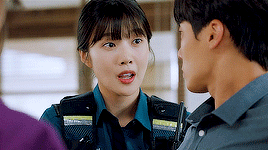
5 notes
·
View notes
Text
💗 My Asian Man Crushes ❣️
🇰🇷
• Jung Il Woo
• Na In-Woo
• Woo-sik Choi
• Lee Sang Yeob
• Cho Seung-woo
• Park Sung-woong
• Joo Won
• Woo Do Hwan
• Go Soo
• Han Suk-Kyu
• Yoon Shi-yoon
• Yoo Min-Kyu
• Yeo Jin-Goo
• Kim Jisoo
🇯🇵
• Yokohama Ryusei
• Yuki Yamada
• Tadanobu Asano
• Ryo Narita
• Kaneko Daichi
• Takasugi Mahiro
• Hayato Isomura
• Murakami Nijiro
♍️ My C Ultimate Men ❤️🔥
• Wang Zhuo Cheng
• Li Chung Lin
• Xiao Kai Zhong
• Wang Hao Xuan
• Wang Hao Ge
• Qin Junjie
• Li Fei
• Yu Cheng En
🧚🏻 My Heart & Soul 🥷🏻
• Zhang Yi Jie (ดั่งดวงตะวัน)
• Shi Zi Xun (เฝ้าฝัน)
Forever Devoted to U 🫰🏻
• Zhu Zan Jin
Adore U Madly 😤🥺
• Qiao Zhen Yu (🥹)
You bewitched me 🫠
• Yang Xu Wen 🤧
I kinda like you a lot 😗
• Zhou Jun Wei (อรุ่มเจ๊าะ)
• Li Jiu Lin (ท่านชาย…)
Slowly Sink into You 😷
• Xia Zhi Guang
🧝🏻♂️ Fascination 🫰🏻
• Zhang Xiao Chen (รักนะจุ๊บๆ)
• Liu Xue Yi (งามราวเทพยดา)
• June Wu
• Li Yun Rui
• Xia Zhi Guang
• Zhang Wan Yi
• Jing Chao
• Ji Chen
• Deng Kai
• Wang Zu Yi
Damn Daddy…🫨🤒
Oh Boy….🥹...!?
I’m so Confused 😭🤯
• Peng Guan Ying
🔆 C interested 🔆
• Quan Yi Lun
• Chen Zhe Yuan
• Zhang Hao Wei
• Zhu Yi Long
• Dylan Wang
• Qu Chu Xiao
• Chen Fei Yu
• Wang Rui Chang
• Wang Xing Yue
• He Feng Tian
Always support 😎
• Daniel Wu
• Mark Chao
• Hu Ge
• Chang Chen
• Karry Wang
• Ethan Juan
• Wang Duo
• Wu Xiubo
• Zhang He
Papi ..!?
• Peter Ho
• Li Ze Feng
• Qin Hao
• Zhou Lu La
👊🏻 Big Fan ✊🏻
• Yang Hui Xiang
• Yang Yang
• Fu Xin Bo
• Zhu Ya Wen
• Chen Kun
• Chen Yi
Imma Fan of you sirs 🤘🏻
• Luo Jin
• Cheng Yi
• Lei Jia Yin
• Eddie Peng
• Zhou Ting Wei
• He Feng Tian
• Xu Zheng Xi
• Gong Jun
• Lu Fang Sheng
😶🌫️ Mix Feelings 🥶
• Chen Xing Xu
• Sheng Yi Lun
• Huang Xuan
• William Chan
• Wang Yi Zhe
• Tan Jian Ci
I maybe like you…sirs 👌🏻😀
• Xia Ning Jun
• Liu Yi Chang
• Zhao Dong Ze
• Wu Yu Heng
10 notes
·
View notes
Text
Rappels sur l’histoire du style Wu Hao
Nous avons donné peu de news depuis l’an dernier, donc voici un nouvel article sur l’histoire, à la fois pour se la rappeler mais aussi pour apporter de nouveaux éléments qui viendront enrichir les précédents.
Le fondateur est donc Wu Yuxiang (1812-1880) de la ville de Yongnian, dans la province du Hebei. Celui-ci était issu d’un famille riche, qui souhaitait le voir fréquenter de prestigieuses écoles. Ses études universitaires étaient axées sur la politique, les sciences sociales et l’art de l’écriture.
Wu Yuxiang avait 2 frères, Wu Cheng Qing (1800-1884) et Wu Ru Qing, qui étaient des membres officiels du gouvernement Qing; tous les 3 étaient des passionnés d’arts martiaux. Ils commencèrent par étudier la boxe Shaolin avec leur père, et par la suite étant devenus plutôt doués ils rencontrèrent Yang Luchan, qui devint leur premier professeur de taijiquan.
Wu Yuxiang était tellement passionné par le taijiquan, qu'il a renoncé à suivre une carrière officielle, comme ses frères, pour se consacrer totalement à la pratique et à la recherche.
Le second professeur de Yuxiang fut Chen Qing Ping, de la lignée de la famille Chen, qui vivait à Zhaobao. Il était connu pour sa puissance dynamique interne et ses petits mouvements.
Son style, une “nouvelle forme” de la famille Chen, était compact, doux et influencé par un maître de l’interne qui se nommait Zhang Yan. Ce style était appelé “Petite Charpente” par opposition à la “Grande Charpente”, caractérisée par des mouvements plus amples et des positions basses. Wu Yuxiang a aidé Chen financièrement, en échange de quoi il devint son élève.
Plus tard, Wu a mis la main sur le document perdu, “Taijiquan lun” (traité du taijiquan), écrit à la main par Wang Zongyue (certains historiens du taijiquan croient que Wu Yuxiang et Wang Zongyue sont la même personne). Ce travail de haute importance n’avait pas été officiellement publié auparavant.
Wu Yuxiang a également contribué à des écrit fondamentaux, qui sont depuis passés à la postérité. Par contre, il n’a pas officiellement enseigné le taiiquan, car faisant partie d’une famille riche il n’avait pas besoin de travailler. Il a pu consacré son temps à la pratique et à la recherche.
La Forme (enchaînement) finale créée contenait 53 mouvements. Son meilleur élève et successeur fut Li Yiyu (1832-1892), également de Yongnian. Celui-ci est l’auteur de ce qui constitue les principes et théories du style Wu/ Li (de leurs 2 noms), connus depuis comme étant les Classiques du Taiji.
Le meilleur élève de Li fut Hao Wei Zhen (1849-1920), connu pour avoir été le professeur de Sun Lutang, fondateur du style Sun. C’est à cette époque que le style est rentré dans la famille Hao.
Weizhen était grand, puissant et très honnête et apprit pendant 10 ans tout ce qu’il put sur le style, jusqu’à la fin de sa vie et atteint un niveau exceptionnel. Il transmit ses connaissances à son successeur, son fils Hao Yueru (1877-1953), qui devint très célèbre.
Hao Yueru développa ce qu’il apprit et conçut la Forme en 96 mouvements, connue comme la Forme Traditionnelle, que l’on pratique depuis et qui est devenue l'enchaînement officiel de la famille Hao.
Il mit l’accent sur le fait que le taijiquan est une forme d’art où la structure interne, l’énergie et un état d’esprit alerte sont des composantes essentielles. Ces 3 composantes sont régulées par une haute conscience mentale aiguisée.
Hao n’a pas uniquement développé les 96 mouvements, étant contemporain de Yang Chengfu (fondateur de la Forme Yang en 108 mouvements) il a fait partie de ces professeurs qui ont amené le tempo lent de l’exécution de l’enchaînement, afin de rendre l’apprentissage accessible à tous les publics. Son importante contribution au style a également été d’introduire les 4 phases qui constituent la base des mouvements du style: Préparation “Qi” (mettre en mouvement le Qi), Continuation “Cheng” (coordonner et différencier le Qi en Yin et Yang), Ouverture “Kai” (laisser sortir l’énergie/ force) et Fermeture “He” (rassembler le Qi dans le corps). Yueru transmit tout son savoir à son fils Hao Shaoru (1908-1983), qui commença enfant et devint son successeur.
Hao Shaoru favorisa la croissance du style Wu Hao plus que quiconque dans la période moderne, allant vivre à Shanghai et enseignant dans toute la Chine. Il eut de nombreux élèves et adopta dans la tradition martiale son plus proche élève Wang Muyin (né en 1958) qui vivait avec lui, n’ayant pas de fils à qui transmettre son héritage. Il lui donna ainsi son nom, nommant Wang "Hao Yinru", sur la base de son propre nom, et en fit son successeur. Hao Yinru a apprit avec son professeur et fut aussi son assistant, pendant les 5 dernières années de sa vie. Il put ainsi bénéficier de ses derniers enseignements.
Hao Shaoru a toujours insisté sur le fait que le taijiquan est un style interne où l’on utilise le “contrôle conscient” pour diriger le Qi. Lorsque le pratiquant atteint un niveau avancé, il doit être capable de contrôler le Qi sans effort à partir du dantian inférieur (la taille) en le dirigeant à travers le corps, de la poitrine vers les bras, les mains et les doigts, du dantian vers les jambes, les pieds et les orteils. Toutes les parties du corps sont ainsi impliquées et agissent conformément à l’intention Yi et le degré de contrôle que possède le pratiquant. Le Qi est généré à travers le corps et irradie vers l’extérieur de manière sphérique. Shaoru a aussi utilisé l’analogie d’un grand ballon qui se gonfle, à la surface élastique, qui absorbe la force adverse et la renvoie, comparant le corps du pratiquant à cette sphère. Le taijiquan étant la manifestation physique des principes Yin et Yang, le Yin représente ce qui est caché à l’intérieur du corps à l’adversaire (l’air à l’intérieur du ballon). Le Yang représente la manifestation externe corporelle de ce yin. Tous les mouvements inutiles deviennent donc superflus, on se concentre sur l’essentiel, et vu de l’extérieur la Forme a l’air très simple.
Le timing constitue également un principe d’une très haute importance et le style Wu Hao insiste sur la nécessité d’attendre l’attaque adverse avec un esprit calme et disponible, afin d’être capable de neutraliser l’agresseur. Cette tactique est subtile, très efficace mais difficile à maîtriser car elle utilise la pleine conscience du pratiquant. l’esprit est détendu et concentré sur le présent (ici et maintenant) de la situation de combat. Le style Wu Hao a affiné à l’extrême le principe de suivre l’adversaire et de connaître simultanément son prochain mouvement, sans lui révéler ses propres intentions. Lorsque l’attaque arrive, elle est détournée et la force entrante est absorbée en Yin et “stockée” dans le corps en utilisant des petits mouvements circulaires qui sont contrôlés par la poitrine (c’est ce qu’on appelle la “force empruntante”). Si cela est nécessaire, on ajoute sa propre force à la force adverse et on la renvoie à l’adversaire, c’est la puissance externe Yang. Le Yin et donc défensif et cède, le Yang est offensif et attaquant, suivant leur nature. Le taijiquan est donc l’application concrète des principes Yin/ Yang, théorie “philosophique” qui a profondément pénétré la pensée chinoise.
#histoireWuHao #HaoWeizhen
#taijiquan hao#taijiquan wu#taijiquan wuhao#hao yinru#hao taijiquan#hao weizhen#histoire style wu hao#wu yuxiang#chen qing ping#sun lutang#kungfu#chi kung#kungfu interne#neijia
2 notes
·
View notes
Note
During the War of the Eight Princes, were there any other notable factions who fought other than the princes?
There were a few, especially later on, though they are usually connected to the Jin civil wars in some ways. For simplicity I will consider the War of the Eight Princes to cover the same time span as the reign of Emperor Hui, 290 - 306. The situation after 306 makes the War of the Eight Princes look almost orderly.
On the frontier there were wars against the Xiongnu leader Hao San in 294 and his brother Duyuan 296.
In 296 there was also major rising of the Qiang and Di, under their leader Qi Wannian, against the Jin. Possibly due to mismanagement by the Jin governor, a certain Sima Lun. Wannian defeated the first Jin army sent against him, commanded by Zhou Chu in 297. Jin forces finally defeated Wannian in 299.
All this warfare caused many people, from several ethnicities, to flee the greater Guanzhong region into Shu. The Jin governor at Chengdu at the time was named Zhao Xin. He gained support from Li Xiang, one of the refugee leaders. The Li clan were originally descended from the native peoples of Ba, but had been resettled in the north by Cao Cao.
In December 300 or January 301, during the regency of Sima Lun, Zhao Xin was recalled to Luouyang. Zhao Xin was worried, as he was a relative of Empress Jia, and rebelled instead. This rebellion lasted about a month, until Zhao Xin killed Li Xiang, and was killed by Xiang’s brother Li Te in turn.
The Jin government struggled to cope with all the refugees, and most of all wanted to send them back. This eventually provoked Li Te to launch his own rebellion in November/December 301. Li Te and his relatives continued to fight against the Jin provincial armies over the next several years. Eventually his son Li Xiong managed to capture Chengdu, he declared himself King of Chengdu in 304, and Emperor of Cheng in 306.
In 303 the Jin government attempted to conscript soldiers in Jing province to fight against Li Te. In June 303 this caused the rebellion of Zhang Chang, a leader among the many southern peoples collectively called the Man. Zhang Chang defeated and killed several Jin generals, including the military governor at Xiangyang, SIma Xin, before being killed by the Jin general Liu Hong on 16 September. Over the next years Liu Hong remained in Jing, declaring his loyalty to the shifting Sima regents, but staying out of the fighting.
In August 303, Zhang Chang had sent one of his leaders, Shi Bing, to conquer Yang province, and he remained there even after Zhang Chang’s defeat. The leading families of Wu rose against in January 304, but he was not finally defeated until May 304 by the Jin general Chen Min. Chen Min in turn declared independence in January 306, taking the title Duke of Chu, which brought him into conflict with Liu Hong.
Liu Baigen, a county prefect in Qing province, rebelled in April 306, he was defeated the same year. His remaining followers were taken over by his subordinate Wang Mi who became a famous robber general over the next years.
On 9 September 304, Sima Ying’s general Shi Chao defeated Sima Yue in the Battle of Dangyin, and brought Emperor Hui back to Sima Ying at Ye. But Sima Ying continued to face resistance from Sima Teng, Yue’s brother and govern of Bing province, and Wang Jun, self-declared governor of You province. While in one sense Wang Jun was just a provincial governor aligned with Sima Yue, in practice his position was more of an independent warlord.
A great source of Wang Jun’s military strength was his alliance with the neighboring Xianbei peoples who he recruited as cavalry for his army, and was quickly winning the war against Sima Ying. One of Sima Ying’s followers was the Xiongnu noble Liu Yuan. He belonged to the remnants of the Southern Xiongnu allowed to settle within Bing province by Cao Cao and Cao Pi, and had received a thorough literary education as well as more traditional Xiongnu upbringing. The Jin government had removed him from his chieftaincy, perhaps for failing to prevent the rebellions in the late 290s, after that he became a military officer for Sima Ying. Liu Yuan now promised that if sent home, he would raise a Xiongnu army to rival Wang Jun’s Xianbei. Sima Ying accepted. Liu Yuan had just gotten started when he learned Sima Ying had been defeated. He continued fighting against Sima Teng on his own, and in December 304 declared himself King of Han.
Gongshi Fan, a former general of Sima Ying, rebelled against Sima Yue in August 305 in Ji province, with the stated intention of restoring Sima Ying, who was then in house arrest in Chang’an. Gongshi Fan was defeated later that autumn, but two of his supporters, Ji Sang and Shi Le, would launch their own rebellion in the same region in 307.
13 notes
·
View notes
Photo
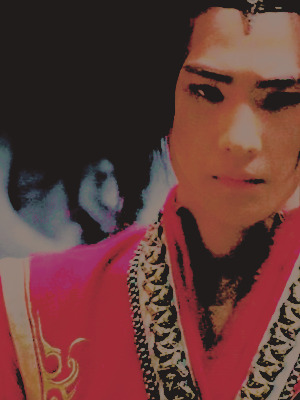
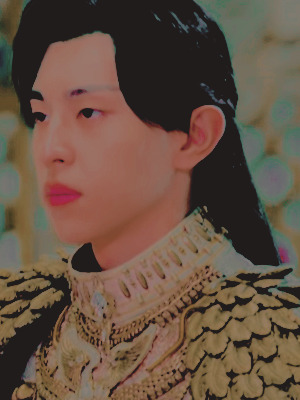



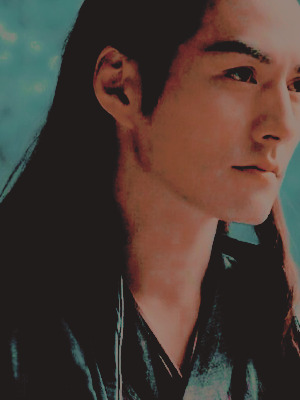



M.ULAN FANCAST : L.I SHANG
YANG YANG / han chinese . ‘91 . many period resources .
DENG LUN / chinese . '92 . a few period drama resources .
HARRY SHUM JR / chinese . '82 . c.rouching tiger h.idden dragon
OHO OU HAO / chinese . ‘92 . a few period drama resources .
WILLIAM CHEN / chinese . '85 . a few period drama resources .
LIN GENG XIN / han chinese . '88 . p.rincess agents .
GODFREY GAO ( Gao Yixiang ) / taiwanese . '84 . c.hinese hero .
ZHANG BIN BIN ( vin zhang ) / chinese . '94 . a few period drama resources .
ZHANG YUNLONG / chinese . ‘88 . a few period drama resources .
6 notes
·
View notes